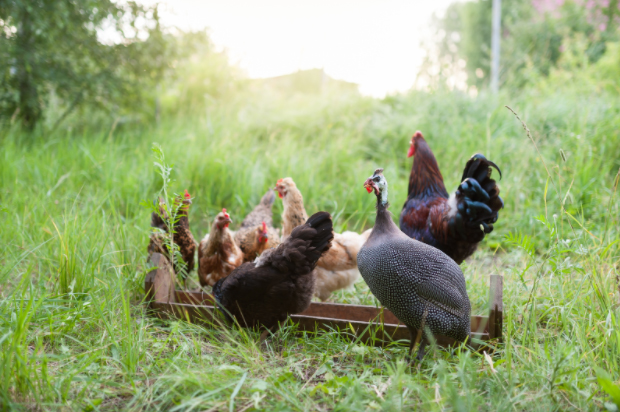How guinea fowl and chickens can live together

Chickens have been part of human families for centuries. They are cute, feed us and keep us entertained so why wouldn’t we want them around? Guinea fowls on the other hand have only recently started gracing us with their presence in our coops.
In the past, people have dismissed guinea fowls as savage and aggressive bush birds, not seeing the benefits that these birds bring to your chicken coop. Today, guinea fowls are quite popular. They may not be great layers, but they are excellent protectors!
But is it really ok to keep these ferocious birds with your precious kindhearted chickens? Do you know and accept the risks? And most importantly, can you trust these peculiar looking birds around your baby chickens? Let’s find out!
Things To Keep In Mind When Keeping Guinea Fowls
- Hunting time
Guinea fowls are excellent hunters when it comes to bugs, small rodents and even snakes. Chickens are also excellent at exterminating bugs, but the guinea fowl far out does them in all categories. Guinea fowls aren’t picky eaters and will eat bugs that other poultry wouldn’t touch with a ten-foot pole. These birds will rid your garden of pests in no time.
Your guinea fowls may now and then turn to pecking at your garden plants as well so it’s a risk you will have to take for their bug exterminating services. When a guinea fowl spots a small mouse, it wouldn’t hesitate to prey on it. Small rodents will for this reason avoid your coop.
Larger mice and rats do, unfortunately, give them more trouble, but they’ll still try to catch them. Guinea fowls can be very noisy. This, however, counts in your favour if you don’t mind the noise. Many predators will be scared away from your yard due to the fearsome presence of these noisy birds.
- Keep the boys apart
Guinea fowl males are very domineering, bossy and aggressive. This macho behaviour is usually only a problem when you also have a rooster. In spring, your guinea fowl males will go into an absolute frenzy since that is when breeding season starts. If you have male guinea fowl, it is best to isolate them from the poultry during breeding season to keep the peace.
- Guinea fowls rule the roost
Whenever there is any kind of dispute in your coop between the guinea fowls and chickens, your chickens will always lose the battle. Most of the time this shouldn’t be a problem since your chickens will happily surrender authority to the top guinea fowl. On rare occasions, you might have a chicken rebelling against this authority, that chicken might be severely bullied by the guinea fowl if you don’t step in.
Male guinea fowls will also get aggressive towards all manner of life around them once the breeding season starts approaching so you might need to separate them from the chickens to keep the chickens intact.
- Guinea fowl raised with chickens take on some chicken tendencies
Many chicken keepers with guinea flows have reported that guinea fowl chicks who are raised with chickens tend to be a lot less aggressive. Guinea fowls who are used to chickens are also easier to get into the coop at night. You will have the best results if you integrate your guinea fowls into your chicken flock from a very young age.
- Some precautions
Have an extra coop for any naughty guinea fowl. You can have a smaller coop where your guinea fowl sleep right next to the chicken coop if you’re scared of any night bullying. Another option to keep the peace is to move them all into a larger enclosure and coop.
Guinea fowls do not adjust to new coops as readily as chickens so try not to switch them around too often. Severe bullying might happen, so be ready to step in immediately at any time.
Guinea fowls are excellent and fearsome predators. They will rid your yard of any pests in no time. Just keep on monitoring your flock and break up any disputes and all should be fine. Most of the time your flock of guinea fowls and chickens will sort out their differences quickly without your help.
If you’re thinking of getting some guinea fowls, it is important that you prepare yourself so you have a backup just in case something goes wrong. Have an extra coop if you need to separate your birds when things get a little testy.


